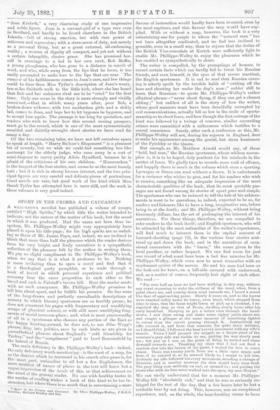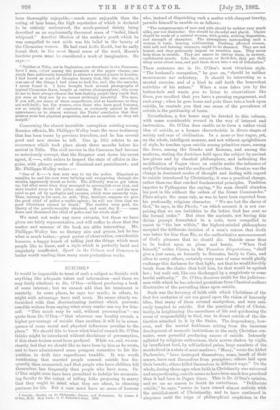SPORT IN THE CRIMEA AND CAUCASUS.*
A WELL-KNOWN novelist has published a volume of essays, -entitled "High Spirits," by which title the writer intended to indicate, not the nature of the matter of his book, but the mood in which it was produced. Had the name not been thus be- spoken, Mr. Phillipps-Wolley might very appropriately have placed it upon his title-page ; for his high spirits are as unfail- ing as those of Mr. James Payn, and, indeed, we are inclined to think that more than half the pleasure which the reader derives from his very bright and lively narratives is a sympathetic reflection of the pleasure felt by the author in writing them. We pay no slight compliment to Mr. Phillipps-Wolley's book, when we say that it is what it professes to be. Nothing is more irritating than to open ir novel and find that it is a theological party pamphlet, or to wade through a book of travel in which personal experience and political -economy bear the same proportion to each• other as the bread and sack in Falstaff's tavern bill. Here the reader meets with no such annoyance. Mr. Phillipps-Wolley promises to tell him about sport, and he fulfills his promise. He has none of the long-drawn and perfectly unrealisable descriptions of scenery to which literary sportsmen are so terribly prone ; he -does not ornament his pages with fragmentary and unedifying scraps of physical science, or with still more unedifying frag- ments of moral common-place ; and, what is most praiseworthy of all in a sportsman who chooses any portion of the East as 'is happy hunting,-ground, he does not, to use Silas Wegg's phrase, drop into politics, save by such hints as are given in Parenthetical phrases about England's "cold friendship for Turkey," and the " compliment " paid to Lord Beaconsfield by the hatred of Russia. The main deficiency in Mr. Phillipps-Wolley's book—indeed, the only deficiency worth mentioning—is the want of a map, for as the district which he traversed in his search after game is, for the most part, unfamiliar to all but a few Englishmen, the mere mention of names of places in the text will leave but a vague impression of the locale of this or that achievement on 'the mind, of the general reader. No one with healthy tastes in the matter of reading wishes a book of this kind to be too in- structive, but where there is so much that is entertaining a mere * sport et the Crimea and Caucasus. By Clive Piampps-woney, F.R.G.S. London: Riohard Bentley and Bon,
flavour of instruction would hardly have been resented, even by the most captious, and this flavour the map wauld have sup- plied. With or without a map, however, 'the book is a very
entertaining one for people in whom the "natural man" has not been altogether eradicated, and we feel less inclined to grumble, even in a small way, than to rejoice that the duties of the British Vice-consulate at Kertch were sufficiently light to enable Mr. Phillipps-Wolley to enjoy the pleasures which he has enabled us sympathetically to share.
The writer is compelled, by the promptings of honour, to record certain facts which can hardly fail to lower his Russian friends, and even himself, in the eyes of that severe martinet, the English sportsman. It is sad to read that Russian cours- ing is utterly spoilt by the terrible habit of "cutting off the hare and shooting her under the dog's nose ;" sadder still to learn that Russians—to quote Mr. Phillipps-Wolley's rather elliptical phrase—" never shoot flying, if they can get a chance sitting ;" but saddest of all is the story of how the writer,. whose good manners must have been dreadfully corrupted by evil communications, actually fell so low in the scale of sports- manship as to shoot foxes, and how though the first outrage of the kind was followed by a twinge of remorse, similar succeeding crimes were committed with a callousness which testifies to a seared conscience. Surely, after such a confession as this, Mr. Phillipps-Wolley will not, during his sojourn in England, dare' to make his appearance among the genial, but stern huntsmeu of the Pytchley or the Quoru.
But enough, as Mr. Matthew Arnold would say, of those "bold, bad men," the Russian sportsmen, whose whilom accom- plice is, it is to be hoped, duly penitent for his misdeeds in the matter of foxes. We gladly turn to records more void, of offence, and happily there is much in the volume which even a sporting Lycurgus or Draco can read without a frown. It is unfortunate for a reviewer who wishes to give, and for his readers who wish to receive, something like an adequate impression of the most characteristic qualities of the book, that its most quotable pas- sages are not found among its stories of sport pure and simple. The sportsman who can be induced to tell the tale of his achieve- ments is wont to be garrulous, is, indeed, expected to be so, for readers and listeners like to have a long, imaginative run, before being in at the death ; and Mr. Phillipps-Wolley, without being tiresomely diffuse, has the art of prolonging the interest of his narratives. For these things, therefore, we are compelled to refer readers to the book itself; and English sportsmen, who will be attracted by the most unfamiliar of the writer's experiences,
will find much to interest them in the capital account of buzzard-shooting (page 12), in the various bear stories scat-
tered up and down the book, and in the narratives of occa-
sional encounters with the " barse," the name given to the local panther, or rather leopard. We can find TOOLTI for just one record of what must have been a bad five minutes for Mr. Phillipps-Wolley, which even now he must remember with an
unpleasant quiver of the nerves. He and his man had been on the look-out for bears, on a hill-side covered with underwood, and, as a matter of course, frequently lost sight of each other.
We read :—
"For over half an hour we had been stalking in this way, without any event occurring to wake the stillness of the wood, when, from a point above me, and coming down wind towards me, I heard a sound like that of approaching game. Slowly it came on, and as the leaves were crushed softly under its heavy, even tread, which stopped from time to time, that the beast might listen or pick up a chestnut, I re- cognised the step as that of Bruin, strolling slowly home after his early breakfast. Stooping to get a better view through the hazel- stems, I saw them swing and shake some eighty yards above me, and caught a glimpse at the same moment of something lighter in colour than the covert passing through it. Instinctively my rifle covered it, and from that moment, for quite three minutes, as I should think, I followed the boar's every movement with my rifle's muzzle. Twice I half pressed the trigger, as a larger piece of the creature's grey side was visible to me, picking his way slowly past me ; but just as I was on the point of firing he turned and cause downhill towards me. Thanking my stars that I had not fired a random shot into the brown of my game, I waited for him to come closer. There was twenty yards from me a little open space, and here, if ho entered it, as he seemed likely to, I meant to kill him. Jealously my rifle followed his every movement, dreading a change of direction, and in another moment tho shot would have boon fired. The gray thing rose suddenly on end, or seemed to ; and parting the thorn-vine with its fore-arms walked into the open, my man Stepan."
We can easily understand that. for a moment Mr. Phillipps- Wolley felt "absolutely sick," and that he was so seriously un- hinged for the rest of the day, that a few hours later he lost a veritable bear by not firing. This, however, was an exceptional experience, and, on the whole, the bear-hunting seems to have
been thoroughly enjoyable,—much more enjoyable than the eating of bear hams, the high reputation of which is declared to be entirely undeserved, the much-praised dainty being described as an unpleasantly flavoured mass of "boiled, black whipcord." Another illusion of the author's youth which he was compelled to cast aside was his belief in the beauty of
the Circassian women. He had read Latta Boo7ch, but he sadly found that, in the meet literal sense of the word, Moore's luscious poem must be considered a work of imagination, Ho says :— "Neither at Tiflis, nor in Daghostan, nor elsewhere in the Caucasus, have I seen, either among the peasants or the upper classes, one single face sufficiently beautiful to attract a second glance in London. I had heard so much of Georgian beauty that, like the aurochs, it was one of the things I had come to look for, and, like the aurochs, I never found it. I have brought back several photographs of typical Circassian faces, bought at various photographers', who seem to me to have always chosen the best-looking people they could find, yet even so they are by no means strikingly beautiful. The men, if you will, are many of them magnificent, and as handsome as they are well-built ; but the women, even those who have good features, are so totally devoid of expression, so extremely animal in their appearance, as to almost warrant the Turks' conclusion that they possess none but physical properties, and are as soulless as they are insipid."
Concerning the almost incredible corruption existing among Russian officials, Mr. Phillipps-Wolley bears the same testimony that has been borne by previous travellers, and he has several good and new stories to tell. One (p. 245) relates to an occurrence which took place about three months before his arrival in Tiflis. The civil service in the Caucasus had become so notoriously corrupt, that the Emperor sent down his secret agent, K—, with orders to inspect the state of affairs in dis- guise, with plenary powers of dismissal and punishment; and Mr. Phillipps-Wolley writes :—
" One of K—'s first acts was to try the police. Disguised as moujiks, he and his men went bullying and swaggering through the streets, apparently drunk as lords. The difficulty was to get taken up, but after some time they managed to accomplish oven that, and were hauled away to the police station. Here X— and his men tried to get off by apologies and excuses, which were naturally vain. Then, turning to his men, he said, Hey, brothers, suppose we giro the good chief of police a rouble apiece he will see then that we good Christians cannot be drunk.' The roubles were paid, the
liberty of the pseudo-moujiks obtained, and next day K Lame down and dismissed the chief of police and his whole staff."
We Must not make any more extracts, but those we have given are fairly representative, and will suffice to show that the matter and manner of the book are alike interesting. Mr. Phillipps-Wolley has no literary airs and graces, but he has what is much better,—great power of observation, considerable humour, a happy knack of telling just the things which most people like to know, and a style which is perfectly lucid and
singularly unaffected. Sport in the Crimea and Caucasus is better worth reading than many more pretentious works.



































 Previous page
Previous page